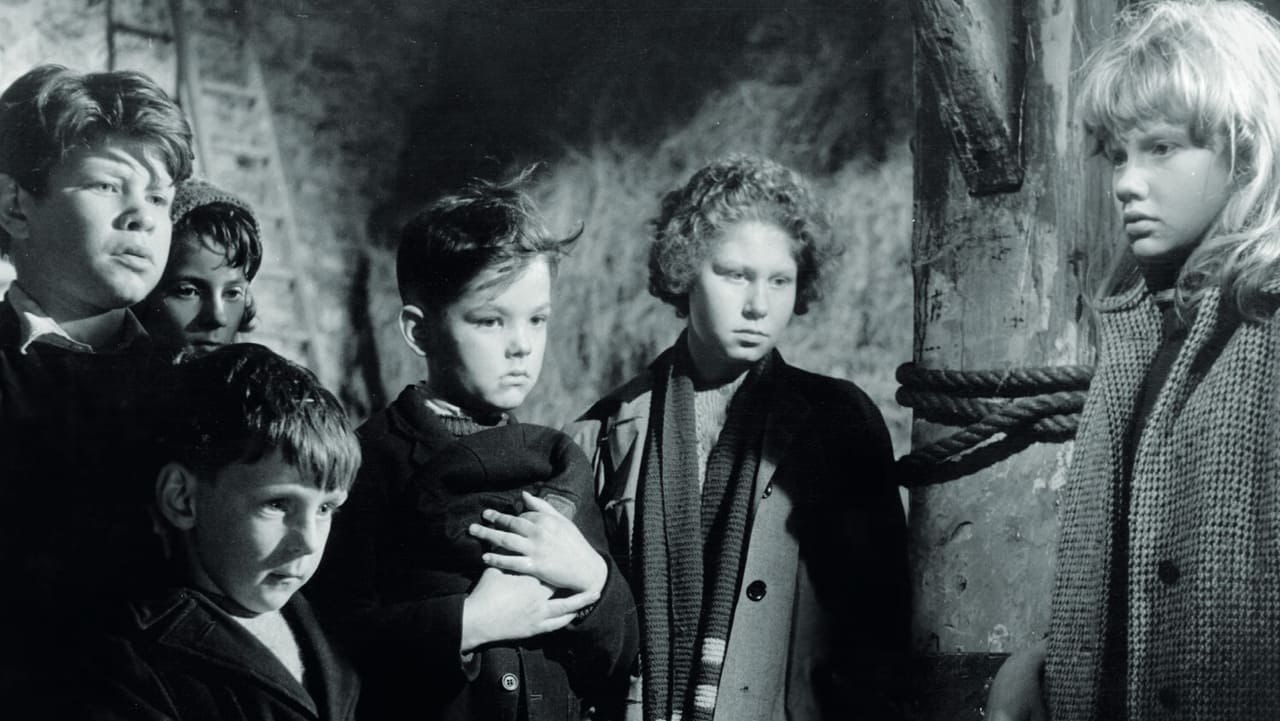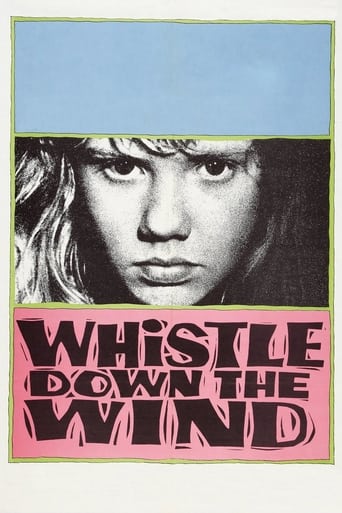Twilightfa
Watch something else. There are very few redeeming qualities to this film.
AshUnow
This is a small, humorous movie in some ways, but it has a huge heart. What a nice experience.
Sameer Callahan
It really made me laugh, but for some moments I was tearing up because I could relate so much.
Fulke
Great example of an old-fashioned, pure-at-heart escapist event movie that doesn't pretend to be anything that it's not and has boat loads of fun being its own ludicrous self.
Artimidor Federkiel
Every once in a while a comparatively small film made with limited resources comes along which is nevertheless much more effective than any polished product a whole array of artists could put together. "Whistle Down the Wind" is one such example, where a British filmmaker (Bryan Forbes) along with a fine cast of adult actors and kids who basically play themselves delivered an instant classic - at least for British audiences. Unknown to the rest of the word, this children's film for the whole family badly needs re-discovery by movie treasure hunters throughout the world.Based on Mary Hayley Bell's novel, it is her daughter Hayley who plays the lead role in this delightfully fresh parable about faith, hope and the confrontation of preached word vs. actual deed. Seen through the eyes of innocent country children we become witness of the Second Coming of Jesus Christ, only that it's a murderer on the run from the law. Thanks to the unwavering spirituality of the kids he gets entrusted with taking care of a kitten, but is as irritated as his unlikely followers are amazed. Will there be a doubting Thomas, a betraying Judas, a change of heart in... a murderer, or will "Jesus" take advantage of his new powers? The movie works with thought-provoking metaphors, but doesn't need any metaphysical exposition. It is so enthralling due to its simplicity of portraying the potent mix of innocence and the strength of belief. "Whistle Down the Wind" features crisp black and white photography with several evocative visual and musical references to the New Testament and of course the children who ask the right questions. It's one of those movies one might enjoy thoroughly as a kid and learn to appreciate in full as a grown up.
Robert J. Maxwell
Alan Bates is a wounded, pursued, exhausted, tattered criminal who winds up in a barn in Lancashire, where he is suddenly discovered by the three children of the Bostock family -- Hayley Mills (the oldest), Diane Holgate, and Alan Barnes. Startled, they leap back as he pulls himself to a sitting position on the hay. "Who are you?", asks Mills. The man moans, "Jesus Christ," and passes out. Believing he is that, the kids believe he can do anything and is infinitely good. They care for him and keep him a secret from the adults, though every other child in town comes to stare at him in awe. His presence is accidentally discovered by the father, Bernard Lee, and the police take him away.The first time I saw this I felt it was not much more than an implausible story aimed at the family audience. (How could school kids ranging in age from about five to about twelve be so naive?) A kind of a Hallmark Greeting Card of a movie with pretty thoughts. And movie children in general should be struck regularly like gongs. Seeing it again, recently, I think there was rather more to it than that.Maybe I can give an example of what I'm getting at. The three Bostock children have just discovered "Jesus" in their barn but, not being particularly religious, don't know much about him. For instance, what will happen if the adults know he's here? Will they crucify him again? And, if he's so all-good, then why did he let the little boy's kitten die? Why does ANYTHING die? So they search out the flinty-looking Vicar who is lunching in town and Mills begins eagerly asking him these tough questions. The nonplussed Vicar dabs at his mouth with his napkin, harrumph, and launches into this gobbledygook speech about how things have to die to make room for new things and how God has more on his mind than just a kitten because he's got the whole world to worry about and we're hurting God more than he's hurting us.Mills listens intently, nodding along with the spiel. She thanks the Vicar, grabs the hand of her little brother and they scurry through the door. The little boy looks up and says, "He doesn't know, does he?" And Mills shakes her head vigorously.The movie wouldn't be as good as it is -- and it IS quite good -- without the performances, the minor characters as well as the principles. I probably shouldn't say this but Hayley Mills was an appealing young girl -- maybe fourteen or fifteen when this was shot -- and sexy too, with her pale forehead, cascade of wavy blond hair, over-sized dark eyes, and plump lower lip. She's also a believable actress. She throws herself into the role with genuine spirit. The two other kids are fine as well. Her younger sister is probably more beautiful, a little angel with hooded eyes. She has the face of the kind of seraph that would inspire St. Teresa of Avila to levitation. The littlest sibling, the boy whose kitten dies, looks like the crudely captious rascal he is, with a scratchy voice and a penchant for calling his sisters names ("You rotten cow") and getting swatted on the head for it. The character is just short of being cute.There's no space to get into it but those questions that Hayley Mills asks of the Vicar are the same that any thoughtful Christian at one time or another asks himself. If God can do anything He wants, then why is there so much evil in the world? The typical Christian answer is that God is testing us. He gave us free will, so we can choose to do either good or evil. Rewards and punishments will be handed out later. Other religions, like Zoroastrianism or Manichaeism, tried to resolve the conundrum by denying God's omnipotence and posing an equally powerful force of darkness. This is a story about children but it's made for grown ups.I was very happy to see that Alan Bates' criminal didn't turn out to be innocent of the crime for which he is going to be punished -- ie., crucified. He appears to be guilty as hell. When the police search him, they find a wrinkled illustration of Jesus torn from a Bible (spelled by the little boy, "B-I-B-E-L") and one of the arresting cops remarks, "You're going to need more than that where you're going," and throws the illustration away. And throughout, Bates does nothing that doesn't advance his self interest. He never says, "Thank you." The final scene has Bates being marched off by the police. He doesn't acknowledge the presence of any of the children who surround the farm's gate, not even Mills, who has a tear on her cheek. I'm ashamed to say that I found the scene touching and even moving. I hate seeing innocence so trampled on, having once been innocent myself.Malcolm Arnold has written a sprightly score that belongs in a nursery but turns a little melancholy when circumstances call for it. It's amusing to hear echoes of Arnold's Martial trumpet ta-ta's left over from "The Bridge on the River Kwai." The direction by Bryan Forbes does all it needs to do. The Lancashire location adds a dismal atmosphere, all ditch and drizzle, fit for rubber boots and raincoats.
screenman
John Mills' daughter, Hayley, leads a sterling British cast of adults and children in this touching story about seriously confused identity.Alan Bates is a dangerous escaped criminal. Wounded and exhausted he takes shelter in the barn at the family's farm. Hayley Mills plays Cathy, a not-to-bright girl on the cusp of puberty who mistakes the criminal for Jesus Christ. It's a bit of a pose; but if you can get your head around it, the rest of the movie is a delight. Cathy has a younger brother and sister who quickly learn the secret, and pretty soon every kid in the neighbourhood knows it too - but not the grown-ups.As the story develops, we see critical elements of Biblical storyline reprised in the lives of the children. The local bully - otherwise in ignorance - forces a younger, weaker child to deny his existence three times, clearly without realising the irony of his actions.Ultimately, their secret escapes. The adults lock him in the barn and call the police. He surrenders without a fight, and whilst being frisked by officers, with his arms outstretched, his posture resembles a crucifixion from a distance, which only cements the belief more completely in Cathy's mind.This movie hails from the heyday of so-called kitchen-sink dramas. Set in the remoteness of north Yorkshire, the scenery is bleak but wonderful. The bleakness is emphasised by filming in black and white, which was almost de rigeur for kitchen-sinkers. Every detail is finely observed, with a farm yard of such cloying muddiness you can almost feel it, and a house that surely smells of fresh bread, preserves and dampness.The script, like the acting is entirely believable and natural. There are no bum roles in this movie. A vicar more spiteful than pious bellyaches about vandalism. Both he and a teacher prove unequal to the questions about life and death that the children raise. The kids themselves never put a foot wrong. A 1960's working-class Yorkshire family is very convincingly recreated, though the rural dialect has clearly been sanitised for broader audience appeal. I am tempted to say over-sanitised, because a little more authenticity might have made 'foreigners' have to think a little, but there are (or perhaps were) some great little nuances of pronunciation that wouldn't have hurt to be included, even if subtitles were needed. But perhaps that's just nit-picking.This is a movie that's as relevant today as it was then. It concerns the great divide between childhood wonder and adult cynicism. Belief, hope and misunderstanding compete with pragmatism and responsibility.All of the technical issues of lighting and editing are up to the standard and evidently modest budget. And finally, there is that haunting theme tune that lingers in your memory as much as the movie itself.Highly recommended viewing for all ages. Every generation can learn something from it.
Andrew Wang
Set in the bleak Pennine Mountains of Lancashire this is a moving story of a young girl who befriends a murderer on the run. The girl lives on a farm with her strict relatives and the murderer hides in a barn. She mistakes him for Jesus and the children of the village seek to protect him from both her relatives and the police. It is at times touching and funny at others. The Lancashire accents, especially those of the children, may be hard for non-British people to understand. Hayley Mills, as the girl, and Alan Bates, the wanted man, excel. The film received four BAFTA nominations - all thoroughly deserved. One was for the performance of Hayley Mills. She is the daughter of Mary Hayley Bell who wrote the novel on which the book is based.

